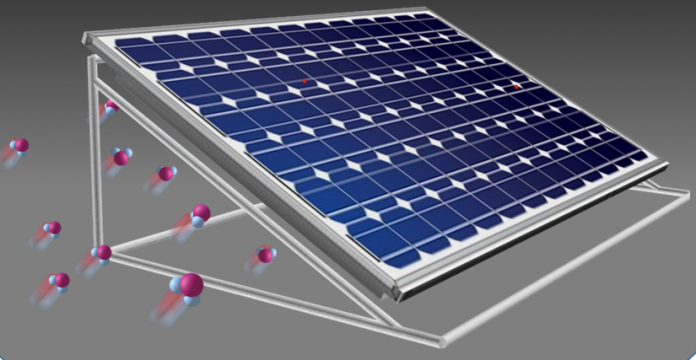Scientists from Saudi Arabia’s King Abdullah University of Science and Technology have developed a cooling solution for photovoltaic panels that uses a sorption-based atmospheric water harvester (AWH).
The device, which can be placed on the back of commercials PV panels, collects atmospheric water during the evening and at night. The collected water is then vaporized and released during the day using waste heat from the PV panel as energy source. The evaporation of the water in turn takes away a significant portion of heat from the panel itself and lower its temperature.
Cooling power
This new solution, according to the researchers, can be applied to both small-scale PV installations and big solar parks.
“Our results show that the AWH can provide an average cooling power of 295 W m–2 when the solar cell is exposed to 1-Sun illumination, leading to a decrease in temperature of >10 °C and an increase in electricity generation of the solar cell of up to 15% relative to the solar cell without the AWH in laboratory conditions,” the research group stated. Outdoor field tests were conducted in the summer and winter in Saudi Arabia and showed that the power yield of the modules was increased by between 19% and 13%. The harvester consists of a substrate made of carbon nanotube (CNT)-embedded cross-linked polyacrylamide (PAM) and a water vapor sorbent made of calcium chloride.
Cleaning
The group explained that the AWH system can also be modified to produce clean water by integrating the hydrogel cooling layer within a water condensation chamber with an enlarged heat dissipation surface area. “In one experiment, an aluminum condensation chamber was attached right beneath the AWH cooling layer (dimensions 5 × 5 × 0.5 cm3), which led to a stable surface temperature of the panel of ~50 °C during the test,” it stated. Through this condensation chamber, the device may also be extended to produce liquid water, which may be used for the cleaning of the modules or simply as potable water.
The scientists added the device may be further improved by enhancing water vapour sorption–desorption kinetics, which would in turn increase its harvesting capacity and reduce material corrosion.
The system is described in the study Photovoltaic panel cooling by atmospheric water sorption–evaporation cycle, published in nature sustainability.






